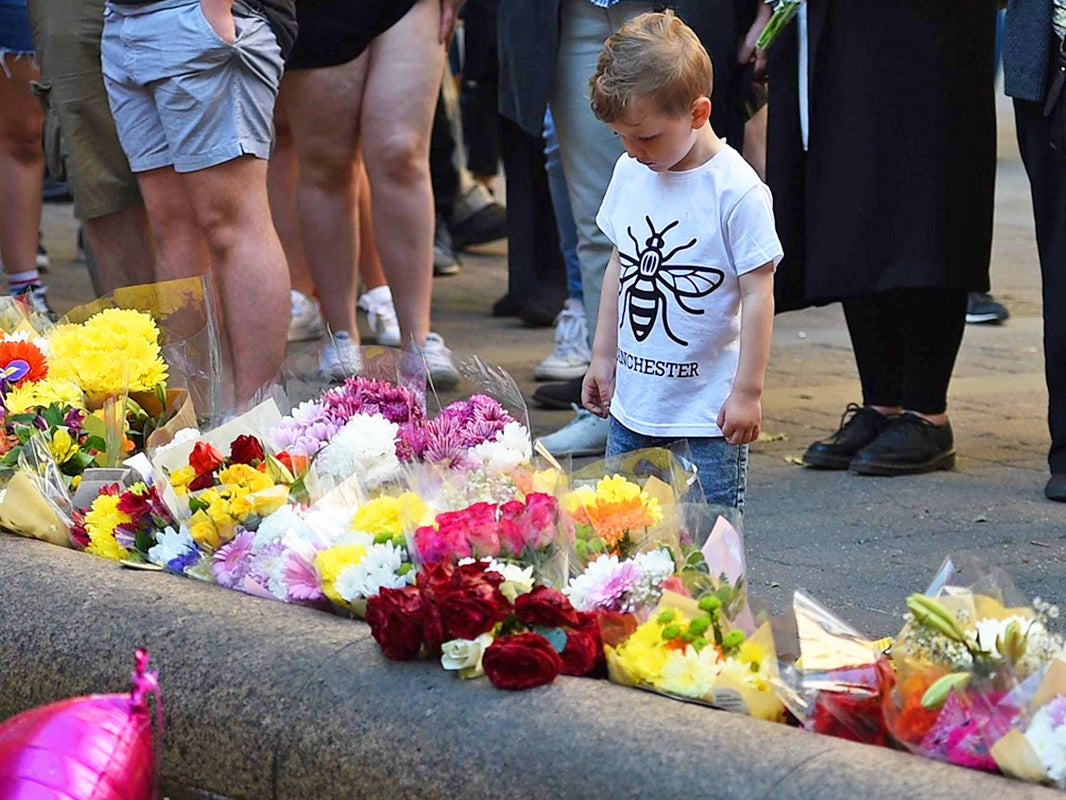Manchester bombing public inquiry to be held partly in secret amid questions over security services ‘failings’
Announcement comes as killer’s brother denies 22 counts of murder over deaths at Ariana Grande concert

A public inquiry is to be held into the deaths of 22 people in the Manchester Arena bombing, the home secretary has announced.
Priti Patel said she had made the decision after “careful consideration” of advice from Sir John Saunders, who had been appointed as coroner for the inquests into the deaths. Sir John had said a public inquiry was necessary to allow some hearings to be held in secret amid questions over “failings” by security services.
The establishment of the inquiry means evidence could be heard in private sessions without the relatives of victims or their lawyers present, a development which is likely to concern some families looking for answers over why the attack was not stopped.
Attacker Salman Abedi, 22, had repeatedly been flagged to authorities over his extremist views before he detonated a suicide bomb at an Ariana Grande concert in May 2017.
A report by the Intelligence and Security Committee (ISC) later highlighted systemic failures among intelligence agencies, police, and the Home Office.
The announcement of the inquiry came as Abedi’s brother denied 22 counts of murder in connection to the attack, in which victims as young as eight died.
At an Old Bailey hearing, Hashem Abedi entered not guilty pleas ahead of a trial scheduled for January. He also faces a single count of attempted murder and conspiring with his brother to cause explosions.
He was extradited to the UK in July after travelling Manchester, where he grew up, to Libya before the attack.
Last year’s ISC report revealed how Salman Abedi was allowed to travel in and out of the UK without restrictions, leave the Prevent anti-terror programme despite, and visit a dangerous extremist in prison.
The public inquiry will be the first into a terror attack on mainland Britain in nearly two decades.
Ms Patel had submitted claims for public interest immunity on behalf of the security services, MI5 and MI6, and the Counter Terrorism Policing North West unit, over information they had on the attack.
Sir John accepted the requests, saying say some details could harm national security and assist terrorists if they were made public.
He also asked to convert the inquest into an inquiry so that he could consider some material in secret.
But at pre-inquest hearings, legal representatives for the families voiced fears over the immunity requests, saying demands for transparency should be “at their highest”.
John Cooper QC, representing several families, told an earlier hearing: “You should bear in mind the very people seeking to restrict material being placed in the public domain, the people making the application are the very people who could potentially be severely criticised, and the ramifications of that are significant.
“There are many in this court that have been in cases where national security has been cited, particularly in military inquests, when perhaps it’s not national security that’s the concern, but national humiliation, in the sense of matters being placed before the court that’s embarrassing to services.”
The barrister added “significant material” that “exposes the shortcomings” of the security agencies was already in the public domain.
Hudgell Solicitors, which represents the families of two victims, said on Tuesday the need to satisfy the need of survivors and victims’ relatives for answers should be “remembered at all stages”.
The legal firm’s Vicky Richardson said: “It is also crucial that the security services and police learn vital lessons to ensure all is done to prevent a similar attack in the future.
“Whilst we appreciate that many will have concerns over some elements of the inquiry being held in private, we fully understand the reasoning behind the decision to allow issues of national security to be considered and investigated out of the public spotlight.”
Inquests into the 7 July 2005 bombings, and the Westminster and London Bridge attacks were all held fully in public.

The Manchester inquests had been due to look at whether the attack could have been prevented and the role of the police and security services, among other issues.
Having public interest immunity means police and security services will be exempt from sharing some of their evidence.
However, Sir John, a retired High Court judge, has told families immunity would not be used to cover up responsibility and said he would do his best to ensure that did not happen.
Ms Patel’s statement said the inquiry was “an important step in ensuring that the families of those who lost their lives in this terrible attack get the answers that they need”.
A previous report found that MI5 received two separate pieces of intelligence on Salman Abedi in the months before the attack.
The significance of the intelligence “was not fully appreciated at the time” but “in retrospect ... can be seen to have been highly relevant to the planned attack”.
Join our commenting forum
Join thought-provoking conversations, follow other Independent readers and see their replies
Comments
Bookmark popover
Removed from bookmarks